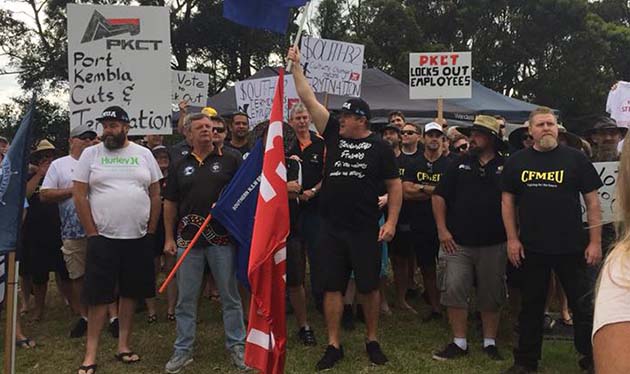Around 100 workers and supporters have picketed the Port Kembla coal terminal, after 60 workers were locked out for four days starting at 7pm on Sunday 7 January.
They are the latest to face bosses’ new tool bosses for slashing workers’ conditions—applying to terminate their Enterprise Agreement.
“We’ve seen a lot of solidarity and support from fellow unionists from around Port Kembla, and hopefully [the protest] sends a clear message”, Paul who is a CFMEU member on site told Solidarity.
The lockout is the latest escalation in a fight over the Port Kembla Coal Terminal (PKCT) enterprise agreement. The terminal management, which is jointly owned by multinational mining companies South 32, Glencore, Peabody Energy, Centennial Coal and Wollongong Coal, want to reduce the scope of the agreement and slash additional benefits such as superannuation that employees have fought for, forgone pay rises for, and won over many years.
The CFMEU and PKCT have held over 60 meetings in the last 2 1/2 years and each time the union thought it was close to agreement the company have taken more away, stone-walling their way to the Fair Work Commission.
Management balloted workers on a vastly inferior agreement in September, which was overwhelmingly rejected. But this was simply a pretence to clear the way to apply to the Fair Work Commission for a termination of the agreement.
The union responded by imposing work bans and limitations and taking strike action over Christmas, only to face a lockout.
Management claims that the business is uncompetitive and is losing tonnes of coal to other ports. But the company itself has put up its shipping charges after spending $300 million to mechanise operations. Glencore and Peabody were part of the decision to make these investments, but they are now the ones sending more coal to Newcastle instead of Port Kembla.
“They seem to want to strip everything away and take everything back to the base award and we’re not up for that,” Paul explained.
The Enterprise Bargaining laws under “Fair Work” are rigged against working people.
“The federal laws, particularly with the Liberals there, are looking after the top end of town. It’s just another attack on unions in this country. The rules are broken and need to be rectified”, Paul said.
PKCT’s application to terminate follows in the footsteps of Aurizon, Griffin Coal, Murdoch University and Streets Ice Creams. If Fair Work rules in its favour workers will lose years of accumulated conditions and be forced back onto the basic Award conditions and pay. At Streets this would have meant pay cuts of up to 46 per cent.
Over the last five years, EBA terminations have more than trebled. The bosses’ efforts to cut wages and conditions are backed up by Turnbull and Cash’s anti-worker laws and attacks on the unions.
Still operating
The terminal has continued to operate during the lockout with scab labour from a so called “professional contingency” workforce operating on site. Mass pickets are needed to blockade the site and stop the scabs getting in.
In December workers at the Webb Dock in Melbourne showed how shutting down the port can deal a blow to the boss. Mass community pickets blockaded the port and ground it to a halt for two weeks, defying the threat of fines. Stopping the scab operation at Port Kembla will need this same willingness to fight and support from across the union movement.
The PKCT workers are keenly aware that if their boss wins, other workers across Port Kembla will soon face the same tactics.
As Paul said, “it not only affects coal terminal workers, this will be widespread around the ports if these guys get their way”.
Stepping up the industrial action and shutting down PKCT is the way to win.
By Steven Kwon and Jean Parker






